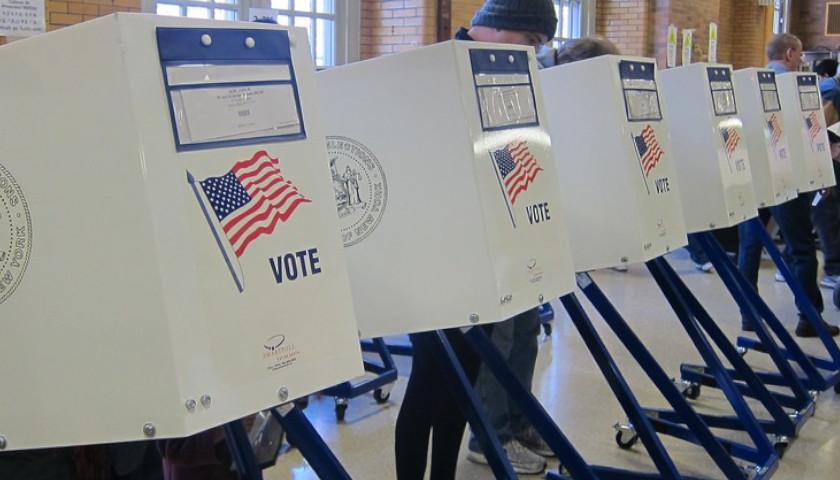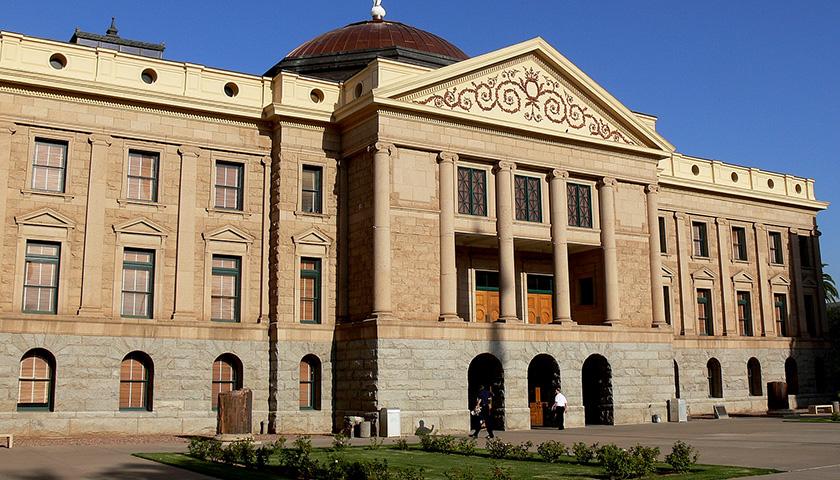Arizona voters will face thirteen propositions on the 2024 ballot. The Republican-led state legislature referred 11 propositions, covering issues ranging from election reforms to judicial term limits. Two citizen-led initiatives, the Arizona for Abortion Access Act and the Make Elections Fair Act, also made the ballot.
Propositions 133-140 are constitutional amendments, while propositions 311-315 are state statutes.
The full, official language for each proposition on the 2024 Arizona ballot is available on the Arizona Secretary of State’s website.
Proposition 133: Partisan Primaries for Partisan Offices
This measure mandates closed partisan primaries for all partisan offices, meaning only registered party members can vote in their primaries. It responds to the Make Elections Fair Act (Prop 140), which advocates for open primaries and potential ranked-choice voting.
Yes: Chuck Coughlin, political consultant, explained on Arizona PBS, “Partisan primaries preserve party identity, ensuring candidates reflect party values.”
No: The Arizona Constitution will not be amended to require partisan primaries and maintain the status quo. According to Arizona PBS, “Critics contend that it could reduce voter participation and limit the diversity of candidates advancing to the general election.”
The provision passed strictly along party lines, with unanimous support from Republicans and no votes from Democrats.
Proposition 134: Voter Initiative Signature Requirements
Creates a signature distribution requirement for citizen-led initiatives to make the ballot, requiring a specific number of signatures from every legislative district rather than just statewide totals.
Yes: According to an Arizona Senate Fact Sheet, this measure would alter the requirements for citizen-led initiatives. To qualify for the ballot, initiatives must gather signatures from at least 10 percent of registered voters in each legislative district—rising to 15 percent if the initiative proposes a constitutional amendment.
The Arizona Farm Bureau, Arizona Free Enterprise Club, and the Goldwater Institute are among those in favor of the proposition.
No: Arizona Democrats strongly oppose Prop 134 and claim it would “give residents of any one area of the state veto power.”
Those opposed include the Arizona Forward Party and the Arizona Public Health Association.
The Republicans voted along party lines to send the measure to the ballot; no Democrats voted for it.
Arizona PBS will host a debate on Proposition 134 on September 9.
Proposition 135: Legislative Control Over State Emergency Declarations
This proposition gives the Arizona Legislature the power to terminate or extend a governor-declared state of emergency after 30 days, excluding war, fire, or flood emergencies.
Yes: Arizona Free Enterprise Club supports the proposition. It “restores checks and balances,” ensuring no governor can indefinitely extend emergency powers.
No: Arizona Public Health Association cautioned that it could delay “critical responses during health emergencies,” such as pandemics, making it harder to respond swiftly and effectively.
Arizona PBS hosted a debate on Prop 135 between Will Humble, executive director of the Arizona Public Health Association, and Greg Blackie, deputy director of Policy for the Arizona Free Enterprise Club.
Our very own Greg Blackie was on 🔥 during this debate on Prop 135! We must have a mechanism in place now that ensures proper checks and balances of the delegated authority no matter what current or future statutes on emergency powers look like. https://t.co/9BAkO49PdP
— Arizona Free Enterprise Club (@azfec) August 10, 2024
Proposition 136: Constitutionality of Citizen-Led Initiatives
The official description states that this bill “Authorizes a person to bring a lawsuit to try to stop a voter-proposed initiative from being placed on the ballot if that person sues at least 100 days before an election and claims the voter-proposed initiative would violate the United States Constitution or the Arizona Constitution.”
Yes: Proponents argue the measure, if passed, would prevent unconstitutional measures from advancing, saving taxpayers the cost of legal battles after they are enacted. According to The Arizona Mirror, State Representative Austin Smith (R-Whitman) argued in caucus, “It’s an opportunity to challenge constitutional amendments, which is actually starting to happen a lot more than they used to.”
No: Opponents claim the measure unfairly targets grassroots initiatives by adding legal hurdles, favoring wealthy interest groups who can afford pre-ballot legal challenges.
On the House floor, as reported by the AZ Mirror, State Representative Laura Terech(D-Phoenix) said that the provision would place an “undue financial burden on citizen-led initiatives,” forcing them to secure significant funds before gaining voter approval. She noted that ballot measures are already subject to legal challenges, and this proposal would only add to the difficulty for Arizonans seeking to enact change.
“This will drastically increase the cost of running initiatives and is deeply undemocratic,” Terech said.
Proposition 137: End Judicial Term Limits
This proposition eliminates term limits for Arizona Supreme Court justices and Superior Court judges and removes the ability for citizens to vote them out. Judges would serve until the mandatory retirement age of 70.
Yes: Supporters argue this will provide stability and continuity in the judicial system, ensuring experienced judges remain on the bench. It would also prevent politically motivated campaigns to unseat justices.
No: Critics say it removes accountability to voters and could protect judges who make unpopular rulings.
State Representative Annalise Ortiz (D-Phoenix) posted her objection to Prop 137 on social media.
Arizona PBS will host a debate on Proposition 137 on September 23.
Proposition 138: Reduced Minimum Wage for Tipped Workers
Allows employers to pay tipped workers 25 percent less than the state’s minimum wage, with the condition that tips make up the difference.
Yes: Advocates argue this would provide flexibility for businesses, helping them manage costs while ensuring workers receive the minimum wage plus tips. It could encourage more hiring in tipped industries.
No: Opponents said this would reduce workers’ earnings, especially in slower economic times or regions with fewer tips. It would roll back protections put in place by the 2016 Fair Wages and Healthy Families Act.
Proposition 139: Arizona for Abortion Access
This citizen-initiated measure would enshrine abortion rights in the Arizona Constitution, protecting healthcare providers from penalties related to abortion services.
Yes: Supporters argue it restores and protects reproductive rights, ensuring that women have access to abortion enshrined in the constitution. This change to the state constitution would make Arizona’s current 15-week abortion ban unconstitutional and would grant women the right to abortion without government interference.
No: Critics claim it could eliminate restrictions on late-term abortions and limit the ability of lawmakers to regulate abortion services, which they view as a potential overreach of state power.
Arizona PBS will host a debate on Proposition 139 on September 16.
Proposition 140: Arizona Open Primaries and Possible Ranked-Choice Voting
This proposition aims to overhaul Arizona’s primary election system by replacing the current partisan primaries with an open, non-partisan primary system. In this model, all candidates, regardless of party affiliation, would appear on a single ballot, and the top vote-getters would advance to the general election. Additionally, ranked-choice voting would be used in general elections if more than two candidates advance from the primary.
Yes: Proponent Sarah Smallhouse, chair of the Make Elections Fair PAC, supports Proposition 140, stating: “With independent and unaffiliated voters now accounting for the largest part of the Arizona electorate, it’s illogical to confine voter choices in the primaries to the very parties they’ve chosen to separate from. Let all candidates compete, let the voters decide, and let the best candidates win”
No: According to Ballotpedia News, “The Arizona State Legislature referred a competing measure, Proposition 133, to the ballot. Proposition 133 would add much of the existing system to the Arizona Constitution, while prohibiting primaries where all candidates, regardless of partisan affiliation, run in the same primaries, such as top-two, top-four, and top-five primaries.” Opponents argue that open primaries might dilute clear party distinctions, as candidates may shift toward more centrist positions to appeal to a wider electorate, undermining the purpose of political parties
Proposition 140 remains uncertain as it faces current litigation. Despite ballots already being printed, the fate of Proposition 140 remains uncertain as the Arizona Supreme Court has allowed the case to proceed. Normally, challenges aren’t accepted after ballots are printed, but this case is moving forward due to 40,000 potential duplicate signatures that still need to be examined.
🚨THE TRUTH ABOUT PROP 140🚨@AZGOP Chair @GinaSwoboda breaks down why #Prop140 is a direct threat to Arizona’s elections. Duplicate signatures, California chaos, and deception — this measure is BAD for Arizona.
Stand with us to protect election integrity! #NoOnProp140 pic.twitter.com/oRuRLkKALx
— Republican Party of Arizona (@AZGOP) August 31, 2024
Proposition 311: New Fines To Fund A Public Benefit For First Responders Killed In The Line Of Duty
Proposes a new $20 fine on all criminal offenses to fund a public life insurance benefit for first responders killed by a criminal act while on duty. Next of kin would receive $250,000 starting in June 2025. Proponents argue it provides essential support to first responders’ families. Critics say it is an additional burden on those convicted of minor crimes.
Proposition 312: Tax Refund For Property Owners Affected By Homelessness
This proposition would allow homeowners to claim a property tax refund for costs incurred due to the police not enforcing laws around public nuisances (like loitering or illegal camping). Supporters see it as a way to hold local governments accountable for managing homelessness, but opponents argue it penalizes vulnerable populations and could incentivize hostility toward “unhoused” individuals.
Keep Arizona's neighborhoods SAFE and vote YES on prop 312. More info: https://t.co/PuEcP1nDQq pic.twitter.com/H97sRlfcsy
— Goldwater Institute (@GoldwaterInst) August 27, 2024
Proposition 313: Mandatory Life Sentence For Child Sex Trafficking Offenders
This measure would create a one-strike law for child sex trafficking offenders, mandating life sentences without the possibility of parole. Supporters believe it offers justice for heinous crimes, but critics are concerned it could lead to unjust sentencing, particularly for trafficking victims coerced into criminal activity.
Arizona PBS hosted a debate on Proposition 313.
Proposition 314: Secure the Border
This provision focuses on immigration and border security, allowing law enforcement to arrest those suspected of illegal entry without a warrant. It also targets employers of undocumented immigrants and increases penalties for fentanyl-related deaths. Supporters see it as a tough stance on border control, while critics highlight the potential for civil rights abuses and costly enforcement burdens.
Proposition 315: Increased legislative oversight on state agency budgets
This would require state agencies to get legislative approval for any rule changes costing over $500,000 over five years, increasing oversight. Advocates argue it increases fiscal responsibility, but detractors warn it could slow down state operations and create bureaucratic red tape.
– – –
Christy Kelly is a reporter at The Arizona Sun Times and The Star News Network. Follow Christy on Twitter / X. Email tips to [email protected].
Photo “Voting Station” by Joe Shlabotnik CC BY-NC-SA 2.0.





